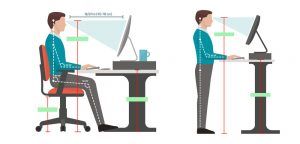Upper Cross Syndrome:
Discussing the common signs and symptoms of Upper Cross Syndrome, and what you can do to avoid this painful condition.

Do you ever feel an intense pain in your neck and upper back after a long day at work?
Tight, achy, sore shoulders and pain in the neck are all symptoms of Upper Cross Syndrome or UCS, which is a common muscular imbalance, often caused by poor posture and slouching.
When you sit at a desk for long hours at work, you’re likely slouching and sitting in a “forward hunched” position. These long hours of slouching put stress on your body in a repetitive way that leads to muscular imbalance.
Postural ergonomics are essential for good back and neck health, which is why eventually your body is going to tell you to correct the imbalance. Your body is communicating with you through pain and if we learn to listen to our body we can address the problem and eliminate the pain.
Identifying Upper Cross Syndrome (UCS)
The symptoms of Upper Cross Syndrome are usually localised at the base of the neck and shoulders, and sometimes can be felt in the upper back. Pain from UCS often feels very tight, especially when bringing your head towards your chest. You might experience a pinching or stabbing pain when looking up towards the ceiling.
How To Avoid UCS
Improve Your Posture – The best way to avoid Upper Cross Syndrome is to improve your posture awareness and be able to self-correct throughout the day. Practicing correct posture when sitting and taking short breaks throughout the day to move around and stretch will help.
Standing Desk – Proper desk set-up is also important for encouraging correct posture and preventing neck pain. To take tension off your neck and shoulders, make sure that your computer monitor is at eye level and your desk is not too high or too low.


While this condition is common and these symptoms are the usual identifiers for Upper Cross Syndrome, it is important to get checked out by your doctor to rule out other possible medical conditions.


